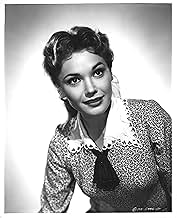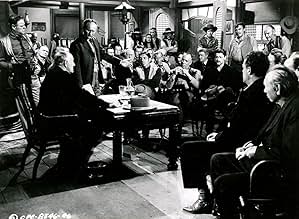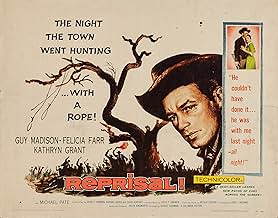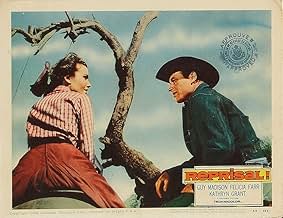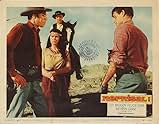Añade un argumento en tu idiomaHalf-breed Frank Madden claims he's White, in order to own land, but violent racial clashes in town force him to abandon his neutrality and chose a side.Half-breed Frank Madden claims he's White, in order to own land, but violent racial clashes in town force him to abandon his neutrality and chose a side.Half-breed Frank Madden claims he's White, in order to own land, but violent racial clashes in town force him to abandon his neutrality and chose a side.
- Dirección
- Guión
- Reparto principal
Fred Aldrich
- Townsman
- (sin acreditar)
Malcolm Atterbury
- Luther Creel
- (sin acreditar)
Arthur Berkeley
- Townsman
- (sin acreditar)
Phillip Breedlove
- Takola
- (sin acreditar)
Patrick R. Brown
- Townsman
- (sin acreditar)
Bruce Cameron
- Townsman
- (sin acreditar)
Donald Chaffin
- Townsman
- (sin acreditar)
Reseñas destacadas
I watched this film by accident, really, but it was actually very entertaining. The actor who played Guy Madison's grandfather was particularly good. I especially liked how the Native Americans were portrayed as human beings and not ruthless killers. This film was released in 1956, which shows a great effort for the producers to make such a film. The message is about unity and the human spirit. For that time period, I found the movie unique. It kept me watching. Plus, Madison has an interesting appeal as an actor because he never really made it big here in the United States. We know not all actors are great actors, and Madison wasn't phenomenal. However, he wasn't bad, either. So why wasn't he more of a major star? And even though I don't watch too many Westerns, I'd rather watch Madison than most of the other Western stars of that time. Like I said, interesting...
10reelguy2
As Frank Madden, Guy Madison has a past more mysterious than Shane's. When he buys a ranch in the Midwest as part of a long-time dream to be a respected land owner, he encounters obstacles at every point.
George Marshall directs this B western with a master's touch. His handling of the mob scene, the near-lynching, the moving confrontation between Guy Madison and the Indian patriarch, and the final shootout are electrifying. Guy Madison gives one of his best performances in what is largely an unsympathetic role.
In 74 minutes this western makes a statement about prejudice against native Americans that is both moving and relevant today. A-budget pictures should be as good.
George Marshall directs this B western with a master's touch. His handling of the mob scene, the near-lynching, the moving confrontation between Guy Madison and the Indian patriarch, and the final shootout are electrifying. Guy Madison gives one of his best performances in what is largely an unsympathetic role.
In 74 minutes this western makes a statement about prejudice against native Americans that is both moving and relevant today. A-budget pictures should be as good.
Incredibly good story, denouncing racism against Native Americans - Indians - one of the earliest western to talk about this scheme, besides the great classics such as BROKEN ARROW of course. This story is excellent in terms of writing, story telling, avoiding clichés, but onlt spoiled by a foreseeable ending. What a surprise to have this George Sherman's film for Columbia instead of Universal, his usual home studio. Guy Madison plays right, good job, but not that terrific. I think this western is a bit underrated for its quality, it should be watched again. I love those Indians characters here, they attract so much empathy.
A delightful surprise...this small, rich wonder of a film surely offers up Guy Madison's best performance...as the compromised cowboy....trying to deal with the racism of his villainous neighbours and their hangers-on. So refreshing to find a 1950s western which goes full-bore at the question of US xenophobia re their dealings with their first nations people. Not a political diatribe.....good simple narrative with well-played, not overplayed, characters, good dramatic ducking and diving.
The original novel was written by Arthur Gordon, a Southerner who was educated at Yale and Oxford. During WWII, he read about a lynching in his home state of Georgia, and was so incensed by it, he came home and wrote Reprisal. The novel is a black/white story, not Indian/white, but otherwise pretty similar. Gordon's anger was based in the fact he was in Europe fighting Facists and Nazis, and back home there were people killing citizens--just like the Nazis. Plus there were thousands of black troops fighting in Europe against the Nazis as well. The injustice was too much, and so the author fought back using his novel to illuminate the issues of race and hate.
¿Sabías que...?
- CuriosidadesThe novel on which this film is based is set in Georgia rather than Oklahoma and takes place during a later period. The lynching is that of an African-American rather than a Native American's as shown in the film.
- ConexionesFeatured in Images of Indians: How Hollywood Stereotyped the Native American (2003)
Selecciones populares
Inicia sesión para calificar y añadir a tu lista para recibir recomendaciones personalizadas
- How long is Reprisal!?Con tecnología de Alexa
Detalles
- Duración
- 1h 14min(74 min)
- Relación de aspecto
- 1.85 : 1
Contribuir a esta página
Sugerir un cambio o añadir el contenido que falta

